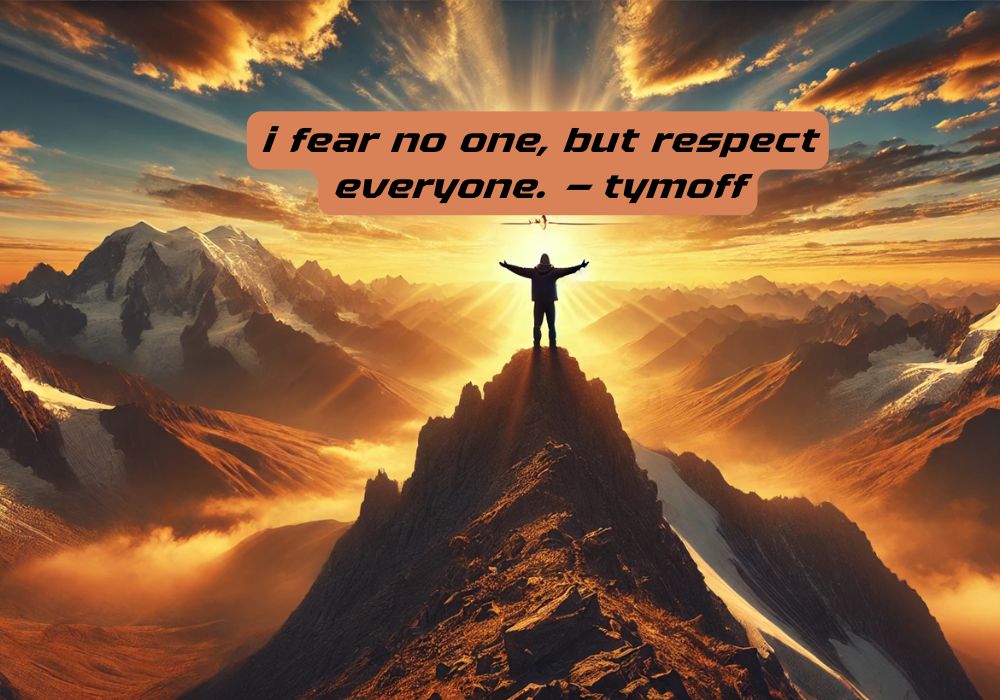Introduction
Tymoff gives us a strong saying: “I Fear No One, But Respect Everyone.” This means we should be brave but also be nice to everyone. It teaches us to face tough times without being scared and to treat people well.
In this article, we will learn more about this saying. We will see what it means to not be scared and to be kind. I have used this idea at work and with friends. It helps a lot!
We will look at how to use these ideas every day. You can use them at school, at home, or when you play. Let’s find out how being brave and kind can make our lives better.
Understanding the Quote
Definition of Key Concepts
“Fear” means feeling scared or worried about getting hurt or failing. “Respect” is when you admire someone and treat them well because they do good things. In the saying by Tymoff, these ideas come together in a special way. It tells us to be brave and not let fear stop us. At the same time, it teaches us to care for others and treat everyone nicely. This helps us to be strong but kind too.
Philosophical Underpinnings
The idea of not fearing anyone but respecting everyone is like the lessons from two old wisdoms, Stoicism and Existentialism. Stoicism tells us to stay calm inside and not let outside things upset us. This helps us not be scared. Existentialism tells us everyone is free to be themselves, and we should honor that. When I use these ideas in my life, I feel braver and I see how great other people are too. This makes life better because I can be strong and still be nice to everyone.
Historical and Cultural Context
Influences and Origins
Tymoff’s saying, “I fear no one but respect everyone,” sounds like something Gandhi or Martin Luther King Jr. would say. These leaders taught us to be strong without being mean. They showed that real strength comes from treating others well, not from being scary. Their lives help us see how being brave and kind can change the world.
Cultural Impact
This idea means a lot in many places around the world. In some countries, especially in the East, being respectful is very important. People there believe respecting others keeps everyone happy and peaceful. In the West, people might see this idea as a good way to be strong on your own, without making others afraid. They think it helps everyone get along better.
This saying helps us understand each other better, no matter where we are from. It teaches us to be kind and not to be afraid of talking to or making friends with anyone. This makes our world a nicer place to live.
Psychological Perspective
Personal Empowerment
Adopting a mindset where you “fear no one but respect everyone” can remarkably boost your self-esteem and overall mental health. When you let go of fear, especially the fear of judgment or failure, you give yourself the freedom to act more authentically. This often leads to making decisions that are aligned with your true values, rather than choices influenced by fear. Imagine stepping into a meeting where instead of worrying about how others perceive you, you focus solely on contributing meaningfully and respecting others’ opinions. Such a shift not only empowers you but also cultivates a personal sense of peace and confidence.
Social Dynamics
This philosophy also profoundly impacts how we interact within our communities and build relationships. Respect is a foundational pillar in any healthy relationship, whether personal or professional. When you approach interactions with respect for everyone, regardless of their status or disagreements you might have, you open the door to more constructive and cooperative relationships. This approach can transform a competitive atmosphere into a collaborative one, where each person feels valued and heard. In community settings, this attitude fosters a sense of inclusivity and belonging, making it easier for diverse groups to work together towards common goals.
Practical Applications of the Philosophy “I Fear No One, But Respect Everyone”
In the Workplace: Leadership and Teamwork
Integrating the “I Fear No One, But Respect Everyone” philosophy into workplace leadership and teamwork can transform an organizational culture. Leaders who embody this mindset inspire trust and respect without instilling fear. This approach fosters an environment where team members feel valued and empowered. For instance, I’ve observed that in teams where leaders treat every idea with respect, members are more likely to contribute innovative solutions without fear of ridicule or dismissal. Such teams tend to be more collaborative and productive, demonstrating how respect can be a powerful motivator, surpassing the limitations set by fear-based approaches.
In Personal Life: Daily Interactions and Personal Growth
Applying this philosophy in one’s personal life can lead to profound self-improvement and healthier relationships. By choosing not to fear others but to respect everyone, individuals encourage openness and honesty in their interactions. From personal experience, adopting this mindset has allowed me to engage more deeply with friends and family, approaching conflicts with a calm demeanor that respects all perspectives. This not only resolves potential misunderstandings more effectively but also strengthens bonds, proving that respect can indeed enhance personal growth and interpersonal connections.
In Conflict Resolution: Role of Fearlessness and Respect
In conflict resolution, the balance of fearlessness and respect is essential. A fearless yet respectful approach ensures that all parties feel heard and valued, minimizing defensive reactions and focusing on constructive dialogue. I once mediated a workplace dispute where emphasizing mutual respect over imposing authority led to an amicable resolution; the parties involved moved from a standoffish attitude to a collaborative one. By fostering an atmosphere where everyone respects each other’s viewpoints, conflicts can be resolved more amicably and effectively, ensuring lasting solutions rather than temporary fixes.
Case Studies
Examples from Public Figures
Nelson Mandela, a towering figure in the struggle for racial equality, personified the philosophy of fearing no one and respecting everyone. His approach to an oppressive regime was rooted in dignity and the refusal to submit to fear, yet he maintained a profound respect for humanity, including his adversaries. This balance facilitated South Africa’s transition from apartheid to a democratic society without spiraling into widespread violence. Mandela’s ability to unite a nation divided by decades of racial injustice exemplifies the powerful impact of leading with respect and fearlessness.
Real-Life Applications
In everyday life, I’ve observed a local community leader, Sarah, embody this ethos. She navigates community conflicts with a bold stance against intimidation, while also engaging community members with utmost respect. Her methods have transformed our neighborhood association from a contentious environment to a cooperative one, where all voices are heard and valued. This real-world application of fearing no one and respecting everyone has strengthened our community bonds and resolved issues more effectively.
Challenges and Criticisms
However, this philosophy doesn’t come without its pitfalls. In some professional settings, such as in highly competitive industries, exhibiting too much openness and respect without assertiveness can sometimes be misconstrued as weakness. This perception can lead to conflicts where individuals may take advantage of perceived leniency. Additionally, critics argue that this mindset might be overly idealistic, particularly in environments where assertiveness and authority are necessary for maintaining order and driving results.
Critiques and Counterarguments
Critics often point out that living by “fear no one, but respect everyone” might not always align with the realities of human psychology and social hierarchies, where fear can be a motivator for respect. However, proponents argue that fostering respect out of recognition rather than fear creates more sustainable and genuine relationships. This approach challenges individuals to develop personal integrity and empathy, which are crucial for effective leadership and harmonious social interactions. This critique invites a deeper examination of how respect can be cultivated in various societal structures without relying on fear as a basis.
Conclusion
Embracing the philosophy of “I Fear No One, But Respect Everyone” can truly change the way we interact with the world around us. By choosing to live fearlessly and with respect, we open up new pathways to understanding and cooperation. This approach not only enriches our personal lives but also enhances our communities. Let’s carry this mantra with us and see how it transforms our daily experiences and relationships.
Frequently Asked Questions
1. What does it mean to fear no one?
To fear no one means to be confident and secure in yourself. You don’t let others intimidate you or hold you back. It’s about facing challenges boldly.
2. How can I show respect to everyone?
You can show respect by listening to others, treating people kindly, and valuing their opinions. It’s important to treat everyone well, even if they are different from you.
3. Can kids practice this philosophy too?
Absolutely! Kids can practice this by being brave in school and kind to their friends. It’s good to start learning these values early.
4. Why is it important to both fear no one and respect everyone?
This balance helps us live happily with others. When we are not afraid, we feel strong. When we respect others, we make friends and get along better. It’s a good way to be a leader and a friend.
Please visit for more info: Ponder Shorts


